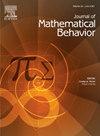What mathematical explanation need not be
IF 1.7
Q3 EDUCATION & EDUCATIONAL RESEARCH
引用次数: 0
Abstract
Recent works in the philosophy of mathematical practice and mathematical education have challenged orthodox views of mathematical explanation by developing Understanding-first accounts according to which mathematical explanation should be cashed out in terms of understanding. In this article, we explore two arguments that might have motivated this move, (i) the context-sensitivity argument and (ii) the inadequacy of knowing why argument. We show that although these arguments are derived from compelling observations, they ultimately rest on a misunderstanding of what Explanation-first accounts are committed to and an underestimation of the resources available to them. By clarifying the terms at play in the debate and distinguishing different objects of evaluation, we show that the insightful observations about practice and education made by challengers to the orthodoxy are in fact best accounted for within the traditional Explanation-first framework.
用不着什么数学解释
最近在数学实践和数学教育哲学方面的工作通过发展理解优先的帐户来挑战正统的数学解释观点,根据该帐户,数学解释应该在理解方面兑现。在本文中,我们探讨了可能促使这一举动的两个论点,(i)上下文敏感性论点和(ii)知道原因的不足论点。我们表明,尽管这些论点是从令人信服的观察中得出的,但它们最终建立在对解释优先的说法所承诺的误解和对可用资源的低估上。通过澄清辩论中发挥作用的术语和区分不同的评估对象,我们表明,正统挑战者对实践和教育的深刻观察实际上最好在传统的解释优先框架中得到解释。
本文章由计算机程序翻译,如有差异,请以英文原文为准。
求助全文
约1分钟内获得全文
求助全文
来源期刊

Journal of Mathematical Behavior
EDUCATION & EDUCATIONAL RESEARCH-
CiteScore
2.70
自引率
17.60%
发文量
69
期刊介绍:
The Journal of Mathematical Behavior solicits original research on the learning and teaching of mathematics. We are interested especially in basic research, research that aims to clarify, in detail and depth, how mathematical ideas develop in learners. Over three decades, our experience confirms a founding premise of this journal: that mathematical thinking, hence mathematics learning as a social enterprise, is special. It is special because mathematics is special, both logically and psychologically. Logically, through the way that mathematical ideas and methods have been built, refined and organized for centuries across a range of cultures; and psychologically, through the variety of ways people today, in many walks of life, make sense of mathematics, develop it, make it their own.
 求助内容:
求助内容: 应助结果提醒方式:
应助结果提醒方式:


